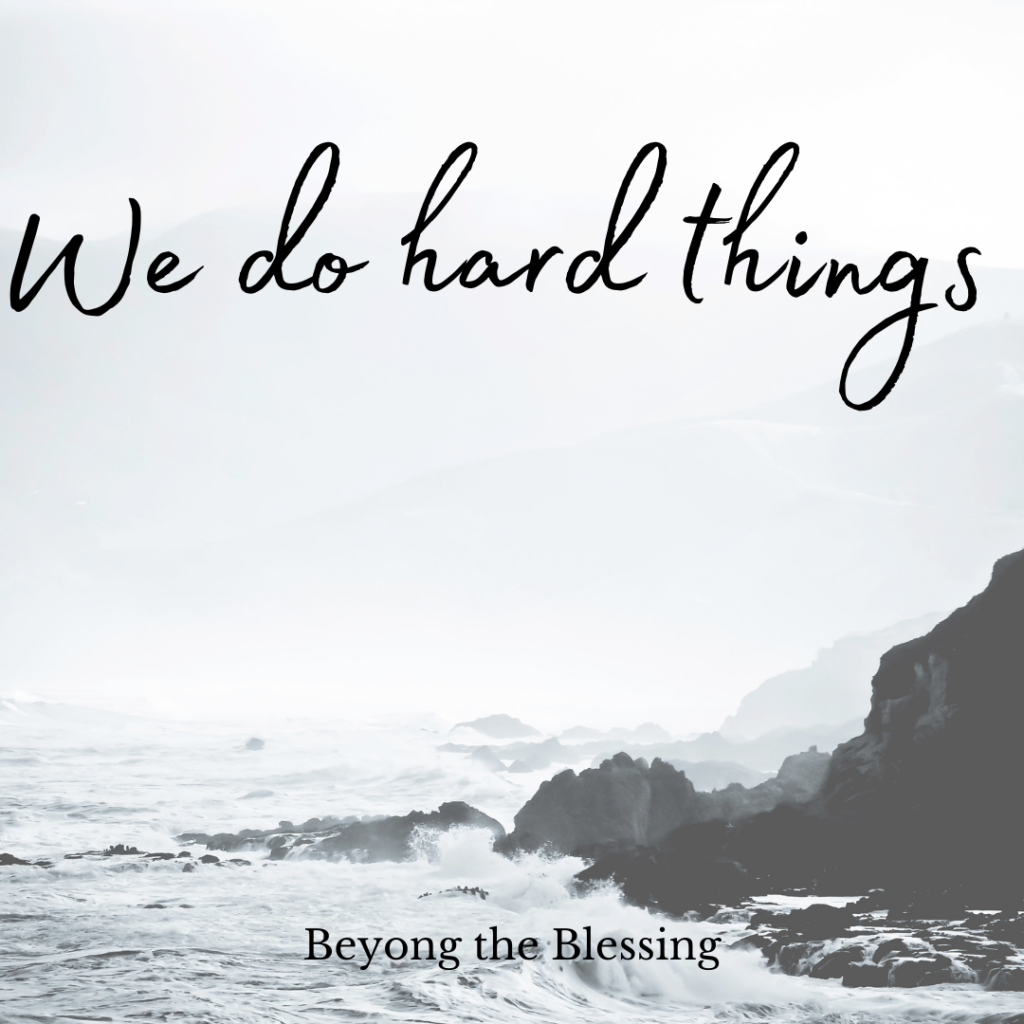
Something we say in our family is “we do hard things”. We preach this to our kids whenever they find themselves facing a challenge physically, academically, relationally, and even spiritually. My husband and I say this to each other. I even say it to myself when I am facing a struggle, to remember that instead of giving up, I need to press forward.
This is not something that my husband and I just came up with one day. We live this out.
That is the only way our kids can put any credence to what we have to say. If we only told them in a, “do what a say, not what I do”, kind of manner what motivation would they have to step into the hard? I know that I have to show my children what this means before I can ask them to try it. Because of that, I have to be open to trying new things, hard things. There was a moment when I distinctly remember this idea of “stepping into the hard” really came to life.
At the request of the organization we signed up to serve, our family had to do several things before we were cleared to make the move to Haiti. We read two books and gave an oral report. We built a budget and fundraised. Adam and I met with the executive director and former staff that had returned to the U.S. We took a class on missions called Perspectives; completed a missions training course as a family. We met with lots of people, built a team, and packed up our lives.
One thing we didn’t do was language acquisition. It wasn’t required and we were in such a hurry to get on the field we figured that we would just learn when we got there. That is what others who had gone before us had done. Surely that would work for us too. A generous donor paid for us to have access to a language app that many professionals used for doing business internationally. Adam and I dug into it some, but it was awkward and weird to hear ourselves saying these foreign words without even being sure we were pronouncing them correctly. Untimely, that bit of training got lost in all of the other things we were doing to be ready to move to another country.
After arriving in country we quickly found ourselves lost in a sea of foreignness.
Everything was different. The food, the stores, the plumbing, electricity—everything. My head was swimming every time I stepped out of my house. The only people who spoke English were the other missionaries and we were all way out numbered by the Haitian staff, students, church goers, and clinic patients who came to the campus where we lived and worked.
I quickly felt very small, isolated, and ill prepared for this mission. One of the missionaries who had lived on campus for several years already stressed the importance of learning the language. She encouraged me to get involved in some way just to help me hear the language more and start learning it. She assured me that the women who worked in the campus cafeteria were all very nice and she would check and see if I could help out in there a couple times a week.
This sounded like a good plan to me. I had spent the last few years working in the church kitchen back home on Monday nights, preparing food for the Alpha program. We would cook for anywhere between 60 and 100 people depending on how big the session was. I had worked with the head chef in the kitchen long enough that I knew her rhythm and could anticipate what she needed and when she needed it. We were a great team. My confidence rose at the idea of working in a kitchen again. This was something I knew! I could do this!
Did I mention that everything was different? It quickly became apparent that this applied to the practices in the kitchen as well.
I was introduced to the head of the kitchen staff and three other ladies who worked with her. None of them spoke English. I was sick-to-my-stomach nervous. After introducing me to the staff my fellow missionary left me to learn from these women. They really didn’t know what to do with me. I didn’t know what to do with them. We didn’t know how to communicate with each other well but they still found a way to show me how to do something- the dishes. Someone always has to wash the dishes.
Part of me was ok with this because I could hang out toward the back of the kitchen and do my own thing. I would watch the ladies as they prepared the food. This was not a sophisticated kitchen. The appliances were far from new but still mostly functional. One item in short supply was cutting boards. This was not a sign of lack but an indication of little need. Most, if not all, of these woman had learned to cook bent over a charcoal stove in a small space outside of their house. These spaces may or may not have had a table near the stove, so woman would hold everything as they cut it. Green peppers were sliced in hand. Onions were diced in hand. I went from being confident in my skills to feeling completely useless.
I did not fit in here. In fact, I stood out like a sore thumb! It was hard to stand there feeling in the way and incapable of really contributing. The women were kind to me but they too didn’t really seam to know how to reach out to this white woman in their kitchen who didn’t speak their language.
What started out as an exciting adventure that I knew would be a challenge quickly became a struggle.
After a couple of weeks of going to the kitchen to “help out”, I started to dread going over there. The potential for fun had not materialized the way I had hoped. The notebook I carried with me every time had a page full of notes, but I didn’t feel any closer to have any level of language skills. The ladies did give me a few opportunities to do something other than just dishes, but I did not have their skill set. One sweet woman tried to show me how to peel a green plantain. She made it look so easy but pretty much all I got for my efforts was laughter and having my work redone. (Later I learned that when it comes to cooking, Haitian women can be very particular about the way things are done. If you don’t do it just right they will be sure to tell you and/or fix it for you. There is a lot of humility required for a foreigner in the world of Haitian food prep!)
As I walked down the sidewalk from my house to the cafeteria one of the days I had said I would be there to help, I thought about quitting. I was anxious, miserable, and felt like my efforts were amounting to nothing. But as I walked, I realized that I couldn’t quit. If I quit I would not just be giving up on an opportunity for language learning, but on the opportunity for relationship building. Ultimately, wasn’t that why I was there? That day I chose to lean into the hard. I made the same choice the next time, and the time after that.
I would love to tell you that eventually things got easier or that my language skills exploded. It did not and they didn’t.
Each day in the kitchen was hard. For the two months after we arrived and before starting our first year of homeschooling, I went to the kitchen twice a week for a couple of hours. When it was time to start school and I no longer had time to give to the kitchen, I was relieved. I had leaned into the hard and made it out of the other side without damaging relationships along the way. Seeing all of the different flavors that went into Haitian dishes was intriguing and sometimes surprising (who knew they used yellow mustard in so many things?,) and I did manage to learn a few words. I wish I could say that I walked away feeling like a part of this group of women, that the cross-cultural struggles went away. I wish I could say that this was the start of deep community for me with this group of women. But none of that was true.
What I can say, is that it was the start of relationships.
Over the three plus years that our family was there those relationships continued to grow. Even though it did’t seem like it in the moment, that time, the consistency, the fact that I kept showing up, made an impact. Not a massive one, but one that planted a seed. Over time I had the opportunity to work with the ladies in the kitchen in different ways. My language skills grew and those relationships grew as well.
In the days leading up to our family’s departure from Haiti to move back to the U.S., I spent time just sitting in the cafeteria kitchen. I talked with the women about their families and they taught me how to make my kids’ favorite Haitian foods. These moments were the exact opposite of what I had experienced before. I was happy to be there and just sit with these wonderful women. It was easy and comfortable. It was where I wanted to be rather than going back to the house and to the responsibilities that awaited me there. They loved me, and I loved them. I will forever cherish their friendship.

I was blessed beyond measure through my time in Haiti because I chose to step into the hard, over and over again. If I had chosen to take the easy path, the path that was more comfortable and familiar, I would have missed out on so much.
God does not often lead us on easy paths. Instead he challenges us, stretches us, and asks us to step outside of our comfort zone. When we stay with what we know and are comfortable with, we will limit what God can do through us. He will never force us to do something. We have to choose his path, his will for our lives.
This is why we are teaching our children to do hard things. If they can practice stepping into the hard now when we are here to help them, they will be more prepared to step into the hard when everything is on the line. I want my kids to experience the freedom and the joy of living a life dependent on God. We want to keep modeling for them what it looks like to follow God’s calling no matter how hard it might be. I know from experience that he works all things together for the good of those who love him, who are called according to his purpose (Romans 8:28).
What hard thing are you facing right now? Will you choose to step into it or walk away? Our natural instinct is to protect the children in our lives. Choosing to allow them to experience hardship is difficult to do! How do you know when to shield your child versus when to let them walk through something hard?



